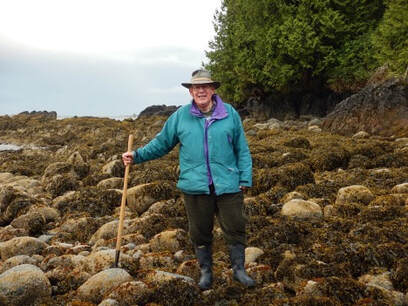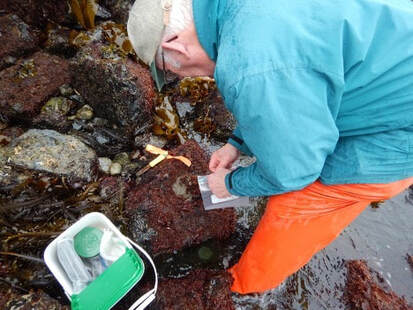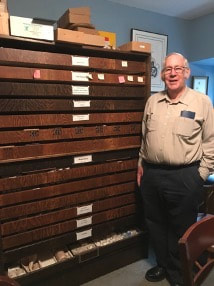 Bill Merilees at Hyphocus Island, Ucluelet, B.C. (May 11, 2017) Bill Merilees at Hyphocus Island, Ucluelet, B.C. (May 11, 2017) Data rescue intern: Lauren Gill Bill Merilees is an accomplished naturalist who has had a long, varied, and productive career. As Bill was influenced by many people through the years, he in turn has influenced and inspired many people throughout his life...  Bill Merilees sampling micromolluscs (March 26, 2018) Bill Merilees sampling micromolluscs (March 26, 2018) Bill's early years were marked by a passion for the outdoors and a love for nature. This passion was reinforced through his life-long membership with Nature Vancouver (Vancouver Natural History Society) that began at the young age of 13. He grew up in Vancouver, British Columbia and spent much of his childhood exploring the forests and coastline of the region. As a young man, he developed an interest in zoology and botany, and pursued these subjects at the University of British Columbia. He gained considerable experience studying and working under Dr. Ian McTaggart Cowen, whom Bill quickly discovered also held a passion for molluscs. One thing led to another, one contact to another, and Bill’s travels began, taking him to all corners of the globe including New Zealand, Australia, Dehli, the Seychelles, Nairobi, and even up to the peaks of Mount Kilimanjaro. Opportunities such as three months spent cleaning monkey bones in Kenya and over a year researching Royal Penguins on Macquarie Island stood out among Bill’s travel experiences. In 1968, Bill moved back to Canada, to become an instructor at Selkrik College in Castlegar, where he received a Rotary International Scholarship to Colorado State University and an MSc in Park Mananagement. He then then moved to Alberta to work for Parks Canada (Waterton Lakes National Park) and finally settled in Nanaimo in 1978 where he worked for BC Parks. After his retirement, Bill became an international tour leader and travel manager, leading trips to places like the Antarctic, Madagascar, and Borneo. He was a frequent visitor to Australia (homeland of his wife), where he led tours of the country's national parks and exploring its vibrant marine life. One of Bill's passions since youth, has been the collection of molluscs. Everywhere he travelled, he spent countless hours exploring the coast and collecting specimens, amassing an impressive collection of gastropods, bivalves, and other marine creatures. From 2008 – 2020, Bill collected over 126,000 specimens of micromolluscs (< 1 cm size) from more than 600 samples spanning the coastal waters of British Columbia and northwest Washington State. From these samples, Bill identified some 300 species, all accompanied by the research-relevant collection data. In 2021, Bill donated his entire mollusc collection to the UBC Beaty Biodiversity Museum. The UBC Marine Invertebrate Collection curatorial team, Sheila Byers and Dr. Chris Harley, were excited to collaborate with Bill to make the collections and data available to the public. The main goal of this Living Data Project was to capture Bill’s extensive records, digitize and integrate them into the Marine Invertebrate Collection database so as to create a dataset with maximum scientific utility. The LDP intern, Lauren Gill, spent 6 weeks working with Bill’s original records – field notes transcribed in Word documents – and transferring them to a comprehensive database that includes associated spatial, temporal, and ecological data. Once the information was scraped from the original word documents and input into a spreadsheet format, the data were checked, cleaned, and formatted. Metadata was also added on each recorded variable. By the end of the project, Lauren had coded a script that efficiently scraped data from text files, checked through data abnormalities, and produced a dataset that can be efficiently used by researchers. Bill's love for the natural world and his dedication to preserving and protecting its biodiversity, is evident in his vast collection and his tireless efforts to educate others about the beauty and complexity of marine life. These data will be essential for understanding patterns in the distribution, abundance, and diversity of micromolluscs in the Pacific Northwest, which is currently poorly understood. The Merilees’ collection is currently held at the Beaty Biodiversity Museum where it will be carefully archived for posterity, research, and public benefits. On completion of the project, the Merilees data will be made publicly available on the Beaty Biodiversity Museum website, as well as through the GBIF repository. Comments are closed.
|
Archives
October 2023
Categories |


 RSS Feed
RSS Feed